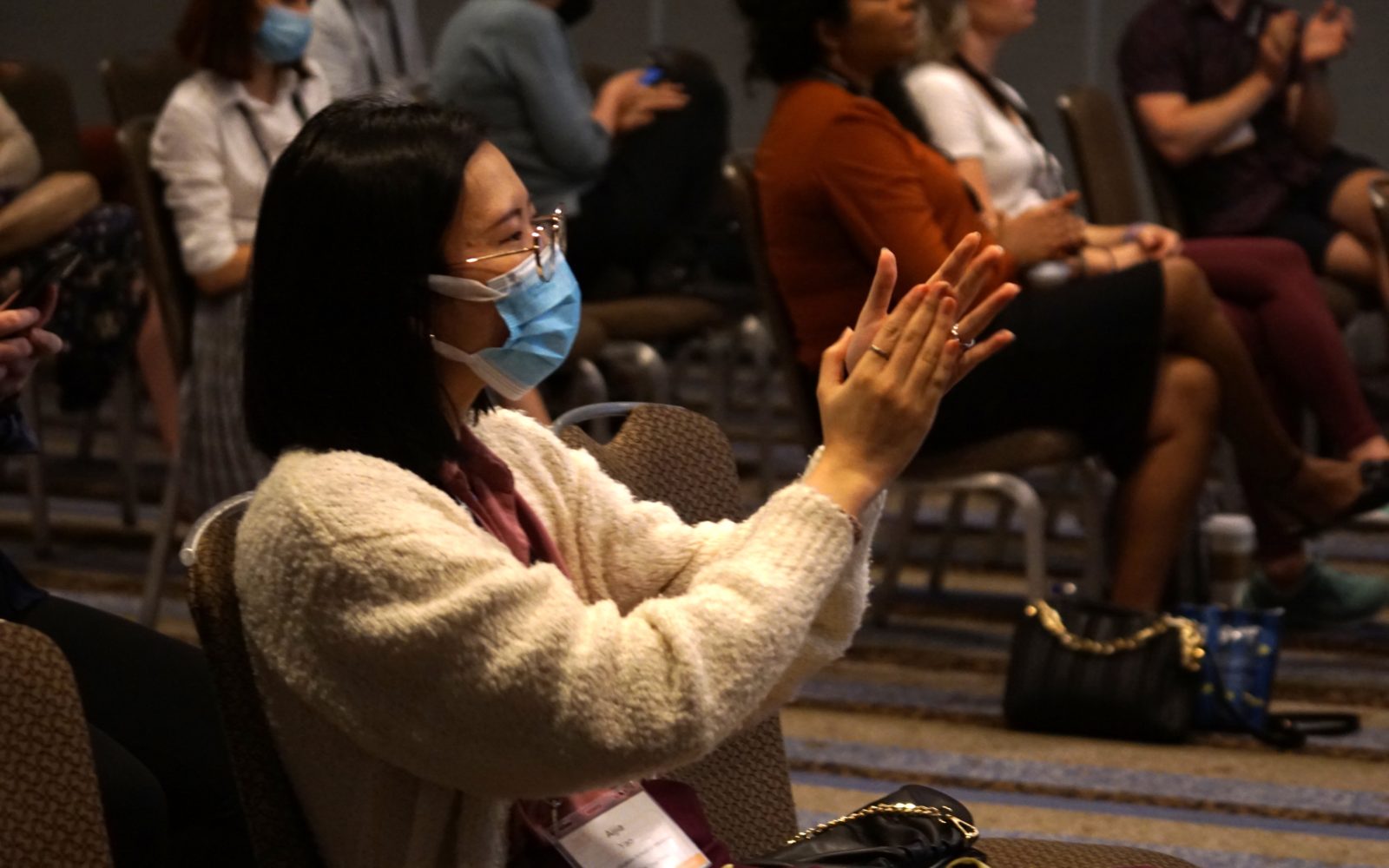Clinical psychologists are committed to alleviating human suffering. So, why is talking about their own psychopathologies stigmatized? A panel of clinical psychologists share their findings on lived experiences of psychopathology and disability among their profession.
Clinical psychological scientists assess and treat the mental, emotional, and behavioral challenges of countless people every day. But one topic is still largely taboo—their own personal experiences with psychopathology.
Despite the nature of clinical psychologists’ work, there is a stigma around disclosing personal mental health difficulties or diagnoses, even if those difficulties or diagnoses are the reason they chose to enter the field. Clinical psychologists face a double-standard—treat and destigmatize mental illness, but hide personal mental health difficulties. In a crowded session at APS 2022, a panel of four clinical psychological scientists discussed how they’re working to combat that stigma.
Jennifer Muehlenkamp (University of Wisconsin) presented findings from a study she co-authored that was recently published in Perspectives on Psychological Science. It found that more than 80% of respondents—including faculty, graduate students, and others affiliated with accredited doctoral and internship programs in clinical, counseling, and school psychology in the United States and Canada—reported lifetime mental health difficulties. Nearly half of the respondents reported a diagnosed mental health disorder. “These data provide the first large-scale empirical evidence of what many in the field have only discussed behind closed doors: namely, that psychologists have at least their fair share of diagnosed and undiagnosed mental health difficulties,” the researchers wrote.
The most commonly reported issues among those with mental health difficulties or diagnoses were depression, generalized anxiety disorder, and suicidal thoughts or behaviors. These rates were similar to or greater than those observed in the general population. Respondents reported, however, that their experience with mental health difficulties did not hinder their professional work.
“We can, and should, do better [in accepting those professionals with lived experience of mental health difficulties], not only to improve our professional climate and training environments, but to strengthen our ability to achieve the core mission of applied psychological science, which is to understand and alleviate human suffering,” the researchers concluded.

Leveraging strengths
Jessica Schleider (Stony Brook University) presented findings from another recent Perspectives study about leveraging the strengths of psychologists with lived experience of psychopathology. She outlined a few common challenges facing these psychologists, such as low stipends making it difficult to access treatment, a dearth of clear policies regarding accommodations, and fears of professional consequences including fewer opportunities, being judged negatively, or losing colleagues’ respect. The authors wrote that psychopathology is not an insurmountable barrier to success in academic psychology, nor should disclosure be expected or coerced.
Notably, the authors also disclosed their experiences with psychopathology—both negative and positive—to improve professional inclusivity in the field. Schleider shared these quotes from the study:
- “After requesting a stop-the-clock for mental health reasons, the disability office told me I just needed a mentor and told me to talk to a senior faculty member in another department. I did not need a mentor; I needed an accommodation.”
- “Being told by my students that a part of their choice to work with me was my openness and transparency about my own lived experience, as this modeled it was okay to not be okay sometimes.”
The paper concluded with a set of preliminary recommendations and next steps to create personal and systemic changes (see sidebar).
“We invite readers, especially individuals in relative positions of power, to identify feasible, concrete steps you can take to move these conversations forward in your lab, program, department, research area, and discipline,” wrote the researchers.
Recommendations and Next Steps
(Victor et al., Leveraging the Strengths of Psychologists With Lived Experience of Psychopathology)
- Develop an infrastructure to gather data towards field-wide standards for promoting accessibility and inclusion related to diverse and intersectional lived psychopathology experiences.
- Improve transparency in contexts where people with lived experience of psychopathology may feel pressured to disclose (or not to disclose) their experiences.
- Reduce barriers to help-seeking among trainees and faculty living with psychopathology.
- Establish clear differentiation between assessment of professional impairment and unfounded judgments regarding lived experience of psychopathology as it relates to suitability for education or employment.
- Reduce barriers to disclosure of psychopathology, for those who may wish to disclose.
- Increase incentives for consideration of psychopathology in diversity, equity, and inclusion (DEI) efforts.
To disclose or not to disclose mental health difficulties?
Laurie Leventhal-Belfer (Stanford University Department of Psychiatry and Behavioral Health and a board member at the Stanford Medicine Alliance for Disability Inclusion and Equity) discussed the conundrum facing many people with mental health difficulties: to disclose or not to disclose. Despite the high prevalence, undergraduates, graduate students, psychologists, and psychiatrists across all levels of training tend to choose not to disclose their diagnoses to anyone, according to Victor et al. in “Only Human.” Although there is fear that disclosing will have a negative professional impact, there are benefits to disclosing. For example, it can yield insight into the organization’s commitment to providing accommodations and into the availability of faculty and programs that can help people navigate available resources. Doing so may also reduce stress about how others will react.
Leventhal-Belfer framed psychopathology as a hidden disability that should be treated the same as physical disabilities. For those who do disclose, “reasonable accommodations” should be readily accessible and clearly defined to reduce subjective judgment, she said.
Leventhal-Belfer recommended advocating for colleagues and students with disabilities, fighting for disability accommodations at academic institutions, creating university positions in charge of disabilities, developing disability curricula, and advocating for change in states’ boards of physicians and psychologists to stop asking for mental health records.
As it stands now, she added, most health science programs and government protections require some type of documentation to receive accommodations. The Americans with Disabilities Act of 1990 protects individuals with disabilities—including mental health disorders—in many aspects of life, such as prohibiting discrimination by state and local governments, including public schools. Section 504 protects all individuals with disabilities, but only in institutions receiving federal funding.
Lastly, Andrew Devendorf (University of South Florida) shared findings from what he said is the first study about self-relevant research (SRR), in which scholars have a lived experience with, or close connection to, their research topic. This study is currently a draft and has not yet been peer-reviewed.
Over 50% of participants—including faculty, graduate students, and others affiliated with doctoral programs in clinical, counseling, and school psychology—had conducted SRR, the study found. Those from minoritized backgrounds were more likely to conduct SRR. Participants who had never done SRR appeared to hold stigmatizing attitudes toward those who did, describing them as biased, irresponsible, or selfish. Conversely, participants who conducted SRR viewed others doing SRR as admirable, motivated, and insightful. Both groups stigmatized the disclosure of SRR, however.
Devendorf and colleagues concluded with a few recommendations. They warned that disclosure of SRR has risks and rewards. Researchers with personal connections to mental health topics (e.g., depression) are more likely to be viewed pejoratively by colleagues than those with personal connections to physical health topics (e.g., cancer). However, disclosing one’s personal connection to one’s research area may also enhance self-empowerment through feelings of authenticity, while promoting dialogue that normalizes acceptance of SRR.
They also proposed that accepting self-relevant researchers connects to diversity and inclusion efforts in psychological science.
“When considering that psychology has continued to struggle to gain adequate representation of these marginalized backgrounds in research, it becomes crucial that psychologists not also discriminate against someone for their personal motivations to pursue research,” they wrote.
Related content: https://www.psychologicalscience.org/news/mental-health-disorders-among-psychologists.html
Feedback on this article? Email apsobserver@psychologicalscience.org or login to comment.
References and related reading
Devendorf, A., Victor, S. E., Rottenberg, J., Miller, R., Lewis, S. P., Muehlenkamp, J. J., & Stage, D. L. (2021). Stigmatizing our own: Self-relevant research (me-search) is common but frowned upon in clinical psychological science. PsyArXiv. https://doi.org/10.31234/osf.io/szg5d
Lawrence, R. (2020, December). Disclosing mental illness: a doctor’s dilemma. BJPsych Bulletin, 44(6), 227-230. https://doi.org/10.1192/bjb.2020.25
Leventhal-Belfer, L. (2020). College on the Autism Spectrum. A Parent’s Guide to Students’ Mental Health and Wellbeing. Jessica Kingsley Publishers.
Meeks, L.M., Cleary, J., & Horwitz, A. (2022). Analysis of depressive symptoms and perceived impairment among physicians across intern year. JAMA Network Open, 5(1) Article e2144919. https://doi.org/10.1001/jamanetworkopen.2021.44919
Seema, J. (2020, March 30). Why so many doctors treat their mental health in secret. New York Times. https://www.nytimes.com/2022/03/30/opinion/doctors-mental-health-stigma.html
Victor, S.E., Devendorf, A. R., Lewis, S. P., Rottenberg, J., Muehlenkamp, J. J., Stage, D. L., & Miller, R. H. (2022). Only human: Mental health difficulties among clinical, counseling, and school psychology faculty and trainees. Perspectives on Psychological Science. Advance online publication. https://doi.org/10.1177/17456916211071079
Victor, S. E., Schleider, J. L., Ammerman, B. A., Bradford, D. E., Devendorf, A. R., Gruber, J., Gunaydin, L. A., Hallion, L. S., Kaufman, E. A., Lewis, S. P., & Stage, D. L. (2022). Leveraging the strengths of psychologists with lived experience of psychopathology. Perspectives on Psychological Science. Advance online publication. https://doi.org/10.1177/17456916211072826
Related content >
-

A Paradox in the Field: Mental-Health Disorders Among Psychologists
What do we know about the prevalence of mental health difficulties among psychological scientists? APS member Sarah Victor, a clinical psychologist and professor at the Texas Tech University, joined APS’s Ludmila Nunes to discuss mental health among psychologists.
-

Snapshots From Chicago: APS’s 2022 Convention Marks the Return of In-Person Science
“An exhausting (but awesome) five days at #apschi22,” as one of the 2,500 attendees tweeted, the event featured a diverse variety of presentations across the major fields of psychological science.
-

Rising Stars of Clinical Science
At APS 2022, up-and-coming researchers share new insights on the pandemic’s mental health impact on people with disabilities, linguistic processes and cognitive reappraisal, and the predictive power of reward positivity.
